- Home
- Cornelia Funke
Inkspell Page 21
Inkspell Read online
Page 21
conjure up flowers and faces no bigger than a pinhead on parchment or paper. You moistened them with a little gum arabic to make the paint cling better. Her fingers itched to pick a brush out of the set and take it away with her for Mo … he ought to have come just for this, she thought, to stand here in this room.
An illuminator’s workshop … Fenoglio’s world seemed twice, three times as wonderful. Elinor would have given one of her little fingers to be standing here now, thought Meggie. She was about to move towards one of the desks to take a closer look at it all, the brushes, the pigments, the parchment, but Fenoglio held her back.
‘Balbulus!’ He sketched a bow. ‘And how is the master today?’ There was no mistaking the mockery in his voice.
‘The Inkweaver wants to see the Lady Violante,’ said the servant in a low voice.
Balbulus pointed to a door behind him. ‘Well, you know where the library is. Or perhaps we had better rename it the Chamber of Forgotten Treasures.’ He lisped slightly, his tongue touching his teeth as if it didn’t have enough room in his mouth. ‘Violante is just looking at my latest work, or what she can see of it. I finished copying out the stories for her son last night. I’d rather have used the parchment for other texts, I must admit, but Violante insisted.’
‘Well, I’m sorry you had to waste your art on such frivolities,’ replied Fenoglio, without so much as glancing at the work Balbulus had before him at the moment. Farid did not seem interested in the picture either. He looked at the window, where the sky outside shone a brighter blue than any of the paints sticking to the fine brushes. But Meggie wanted to see how good Balbulus was at his art, and whether his haughty attitude was justified. Unobtrusively, she took a step forward. She saw a picture framed in gold leaf, showing a castle among green hills, a forest, magnificently dressed riders among the trees, fairies fluttering around them, and a white stag turning to flee. Never before had she seen such a picture. It glowed like stained glass – like a window placed on the parchment. She would have loved to look at it more closely, see the faces, the horses’ harnesses, the flowers and clouds, but Balbulus cast her such an icy glance that she retreated, blushing.
‘That poem you brought yesterday,’ said Balbulus in a bored voice, as he bent over his work again, ‘it was good. You ought to write such things more often, but I know you prefer writing stories for children or songs for the Motley Folk. And why? Just for the wind to sing your words? The spoken word is nothing, it hardly lives longer than an insect! Only the written word is eternal.’
‘Eternal?’ Fenoglio made the word sound as if there could be nothing more ridiculous in the world. ‘Nothing’s eternal – and what happier fate could words have than to be sung by minstrels? Yes, of course they change the words, they sing them slightly differently every time, but isn’t that in itself wonderful? A story wearing another dress every time you hear it – what could be better? A story that grows and puts out flowers like a living thing! But look at the stories people press in books! They may last longer, yes, but they breathe only when someone opens the book. They are sound pressed between the pages, and only a voice can bring them back to life! Then they throw off sparks, Balbulus! Then they go free as birds flying out into the world. Perhaps you’re right, and the paper makes them immortal. But why should I care? Will I live on, neatly pressed between the pages with my words? Nonsense! We’re none of us immortal; even the finest words don’t change that, do they?’
Balbulus had listened to him without any expression on his face. ‘What an unusual opinion, Inkweaver!’ he said. ‘For my part, I think highly of the immortality of my work, and very poorly of minstrels. But why don’t you go in to Violante? She’ll probably have to leave soon, to hear some peasant’s woes or listen to a merchant complaining of the highwaymen who make the roads unsafe. It’s almost impossible to get hold of acceptable parchment these days. Robbers steal it and offer it for sale in the markets at outrageous prices! Have you any idea how many goats must be slaughtered for me to write down one of your stories?’
‘About one for each double spread,’ said Meggie, earning another icy look from Balbulus.
‘Clever girl,’ he said, in a tone that made his words sound more like blame than praise. ‘And why? Because those fools the goatherds drive them through thorns and prickly bushes, without stopping to think that their skins will be needed for parchment!’
‘Oh, come, I keep telling you!’ said Fenoglio, steering Meggie and Farid towards the library door. ‘Paper, Balbulus. Paper is the material of the future.’
‘Paper!’ she heard Balbulus mutter scornfully. ‘Good heavens, Inkweaver, you’re even crazier than I thought.’
Meggie had visited more libraries with Mo than she could count. Many had been larger than the Laughing Prince’s, but few were more beautiful. You could still see that it had once been its owner’s favourite place. The only trace of Cosimo here was a white stone bust; someone had laid roses in front of it. The tapestries on the high walls were finer than those in the throne-room, the sconces heavier, the colours warmer, and Meggie had seen enough in Balbulus’s workshop to guess what treasures surrounded her here. They stood chained to the shelves, not spine beside spine like the books in Elinor’s library, but with the cut edge facing forward, because that was where the title was. In front of the shelves were rows of desks, presumably reserved for the latest precious acquisitions. Books lay on them, chained like their sisters in the shelves, and closed so that no harmful ray of light could fall on Balbulus’s pictures. In addition all the library windows were hung with heavy fabric; obviously the Prince of Sighs knew what damage sunlight did to books. Only two windows let in the light that might harm them. Her Ugliness stood in front of one window, bending so low over a book that her nose almost touched the pages.
‘Balbulus is getting better and better, Brianna,’ she said.
‘He’s greedy! A pearl, just for letting you into your father-in-law’s library!’ Her maidservant was standing at the other window looking out, while Violante’s son tugged at her hand.
‘Brianna!’ he whined. ‘Come on! This is boring. Come on out into the courtyard. You promised.’
‘He uses the money from the pearls to buy new pigments! How else would he get them, when no one in this castle will pay gold for anything but statues of a dead man?’ Violante jumped when Fenoglio closed the door behind him, guiltily hiding the book behind her back. Only when she saw who it was did her face relax. ‘Fenoglio!’ she said, pushing her mousy brown hair back from her forehead. ‘Must you scare me like that?’ The mark on her face was like a paw-print.
Fenoglio smiled, and put his hand to the bag at his belt. ‘I’ve brought you something.’
Violante’s fingers closed greedily on the red stone. Her hands were small and rounded like a child’s. She quickly reopened the book she had hidden behind her back and held the beryl up to one of her eyes.
‘Come on, Brianna, or I’ll tell them to cut your hair off!’ Jacopo took a handful of the maid’s hair and pulled it so hard that she screamed. ‘That’s what my grandfather does. He shaves them bald, the minstrel girls and the women who live in the forest. He says they turn into owls by night and screech outside your windows till you’re dead in your bed.’
‘Don’t look at me like that!’ Fenoglio whispered to Meggie. ‘I didn’t invent this little horror. Here, Jacopo!’ He dug his elbow imperatively into Farid’s ribs as Brianna went on trying to free her hair from the child’s small fingers. ‘Look, I’ve brought someone to see you.’
Jacopo let go of Brianna’s hair and examined Farid with little enthusiasm. ‘He doesn’t have a sword,’ he pointed out.
‘A sword! Who needs a sword?’ Fenoglio wrinkled his nose. ‘Farid is a fire-eater.’
Brianna raised her head and looked at Farid. But Jacopo was still inspecting him as unenthusiastically as ever.
‘Oh, this stone is wonderful!’ his mother murmured. ‘My old one wasn’t half so good. I can make them all out, Brianna, e
very character. Did I ever tell you how my mother taught me to read by making up a little song for each letter?’ She began to chant quietly: ‘A brown bear bites off a big bit of B … I didn’t see particularly well even then, but she traced them on the floor very large for me, laying them out with flower petals or little stones. A, B, C, the minstrel plays for me.’
‘No,’ said Brianna. ‘No, you never told me.’
Jacopo was still staring at Farid. ‘He was at my festivities!’ he said. ‘He threw torches.’
‘That was nothing, just a children’s game.’ Farid was looking patronizingly at the boy, as if he himself and not Jacopo were the Prince’s son. ‘I can do other tricks too, but I don’t think you’re old enough for them.’
Meggie saw Brianna hide a smile as she took the comb out of her pale red hair and pinned it up again. She did it very prettily. Farid was watching her, and for the first time in her life Meggie wished that she had such lovely hair, although she wasn’t sure that she could manage to put a comb in it so gracefully. Luckily Jacopo attracted Farid’s attention again by clearing his throat and folding his arms. He had probably copied the mannerism from his grandfather.
‘Show me or I’ll have you whipped.’ The threat sounded ridiculous, uttered in such a shrill voice – yet at the same time it was more terrible than if it had come from an adult mouth.
‘Oh, will you?’ Farid’s face gave nothing away. He had obviously learned a thing or two from Dustfinger. ‘And what do you think I’d do to you then?’
This left Jacopo speechless, but just as he was about to appeal to his mother for support Farid reached out his hand to the boy. ‘Very well, come along, then.’
Jacopo hesitated, and for a moment Meggie was tempted to take Farid’s hand herself and follow him into the courtyard, instead of listening to Fenoglio trying to follow a dead man’s trail, but Jacopo moved faster. His pale, stubby fingers gripped Farid’s brown hand tightly, and when he turned in the doorway his face was that of a happy, perfectly ordinary little boy. ‘He’s going to show me tricks, did you hear?’ he said proudly, but his mother didn’t even look up.
‘Oh, what a wonderful stone,’ was all she whispered. ‘If only it wasn’t red, if only I had one for each eye—’
‘Well, I’m working on a way around that, but I’m afraid I haven’t found the right glassmaker yet.’ With a sigh, Fenoglio dropped into one of the chairs invitingly arranged among the reading desks. They all bore the old coat of arms on their leather upholstery, the one where the lion was not shedding tears, and the leather of some was so worn that you could clearly tell how many hours the Laughing Prince had once spent here – until grief sapped his pleasure in books.
‘A glassmaker? Why a glassmaker?’ Violante gazed at Fenoglio through the beryl. It looked almost as if her eye was made of fire.
‘Glass can be ground to make your eyes see better, much better than through a stone, but there isn’t a glazier in Ombra who knows what I’m talking about!’
‘Oh, I know, only the stonemasons are good for anything in this place! Balbulus says there’s not a single decent book-binder in all Lombrica.’
I could tell you the name of a good one, thought Meggie instinctively, and for a moment she wished Mo were here, so much that it hurt. But Her Ugliness was looking at her book again. ‘There are good glaziers in my father’s realm,’ she said, without glancing up. ‘He’s had several windows in his castle filled in with glass. He had to sell off a hundred of his peasants to go for soldiers to pay for it.’ Violante seemed to consider the price well worth paying.
I don’t think I like her, thought Meggie, as she went slowly from desk to desk. The bindings of the books lying on them were beautiful, and she would have loved to hide at least one of them under her dress, so that she could look at it in Fenoglio’s room at her leisure, but the clips holding the chains in place were firmly riveted to the wooden covers of the books.
‘You’re welcome to look at them.’ Her Ugliness spoke to Meggie so suddenly that she jumped. Violante was still holding the red stone up to her eye, and Meggie was reminded of the blood-red jewels at the corners of the Adderhead’s nostrils. His daughter resembled her father more than she probably knew.
‘Thank you,’ murmured Meggie, and opened one. She remembered the day when Mo had shown her how to open an old book without using her fingers. He had handed her a book with two brass clasps holding its wooden covers together, she had looked at him, baffled, and then, smiling at her, he had struck the front of the book so hard with his fist that the clasps snapped open like little mouths, and the book was opened as if by a ghostly hand.
But the book that Meggie opened in the Laughing Prince’s library showed no sign of age, as that other book had done. No speck of mould disfigured the parchment, no beetles or bookworms had nibbled it, like some of the manuscripts she had seen when Mo restored them. The years were not kind to parchment and paper; a book had many enemies, and in time it withered like a human body. ‘Which tells us, Meggie,’ Mo always said, ‘that a book is a living thing!’ If only she could have shown him this one!
Very, very carefully she turned the pages – yet her mind was not entirely on what she was doing, for the wind blew Farid’s voice into the room like the memory of another world. Meggie listened to what was going on outside as she snapped the clasps of the book shut again. Fenoglio and Violante were still talking about useless bookbinders. Neither of them was taking any notice of her, and Meggie stole over to one of the darkened windows and peered through the gap in the curtains. Her glance fell on a walled garden, beds full of brightly coloured flowers, and Farid standing among them letting flames lick their way up his bare arms, just as Dustfinger had done the first time Meggie saw him breathing fire back in Elinor’s garden, before he betrayed her …
Jacopo was laughing exuberantly. He clapped – and then stumbled back in alarm as Farid sent the torches whirling through the air like Catherine wheels. Meggie couldn’t help smiling; Dustfinger had certainly taught him a lot, even if Farid couldn’t yet breathe fire quite so high in the air as his teacher.
‘Books? No, I told you, Cosimo never came in here!’ Violante’s voice suddenly sounded considerably sharper, and Meggie turned round. ‘He thought nothing of books, he loved dogs, good boots, a fast horse … there were days when he even loved his son. But I don’t want to talk about him.’
Laughter drifted up from outside again. Brianna joined Meggie at the window. ‘The boy’s a very good fire-eater,’ she said.
‘Really?’ Her short-sighted mistress looked at her. ‘I thought you didn’t like fire-eaters. You’re always saying they’re feckless folk.’
‘This one’s good. Much better than Sootbird.’ Brianna’s voice sounded husky. ‘I noticed him at the celebrations.’
‘Violante!’ Fenoglio sounded impatient. ‘Could we forget about that fire-breathing boy for a moment? Very well, so Cosimo didn’t like books. These things happen. But surely you can tell me a little more about him!’
‘Why?’ Her Ugliness raised the beryl to her eye again. ‘Let Cosimo rest in peace, he’s dead! The dead don’t want to linger here. Why won’t anyone understand that? And if you want to know some secret about him – well, he had none! He could talk about weapons for hours on end. He liked fire-eaters and knife-throwers and wild rides through the night. He had the smiths show him how to forge a sword, and he fenced for hours with the guards down in the courtyard until he’d mastered every trick they knew, but when the minstrels struck up their songs he began yawning after the first verse. He wouldn’t have cared for any of the songs you’ve written about him. He might have liked the robber songs, but as for the idea that words can be like music, making the heart beat faster … he had no ear for that! Even executions interested him more than words, although he never enjoyed them the way my father does.’
‘Really?’ Fenoglio sounded surprised but by no means disappointed. ‘Wild rides through the night,’ he murmured. ‘Fast horses. Yes, why not?’
Her Ugliness wasn’t listening to him. ‘Brianna!’ she said. ‘Take this book. If I praise Balbulus enough for his new pictures, perhaps he’ll leave it with us for a while.’ Her maid took the book from her, an abstracted expression on her face, and went to the window again.
‘But the people loved him, didn’t they?’ Fenoglio had risen from his chair. ‘Cosimo was good to them … to the peasants, the poor … the strolling players.’
Violante stroked the mark on her cheek. ‘Yes, they all loved him. He was so handsome that you just had to love him. You couldn’t help it. But as for the peasants—’ and she wearily rubbed her short-sighted eyes – ‘do you know what he always said about them? Why are they so ugly, he asked? Ugly clothes, ugly faces … when they brought their disputes to him he really did try to do justice fairly, but it bored him to tears. He could hardly wait to get away again, back to his father’s soldiers, his horse and his hounds …’
Fenoglio said nothing. He looked so baffled that Meggie almost felt sorry for him. Isn’t he going to make me read aloud after all, she wondered? And for a strange moment she felt something like disappointment.
‘Come along, Brianna!’ ordered Her Ugliness, but her maid did not stir. She was gazing down at the courtyard as if she had never seen a fire-eater in her life before.
Frowning, Violante went over to her. ‘What are you staring at?’ she asked, squinting through the window with her short-sighted eyes.
‘He … he’s making flowers from fire,’ stammered Brianna. ‘They start like golden buds and then they unfold like real flowers. I once saw something like that … when I was very little …’
‘Yes, very nice, but come along now.’ Her Ugliness turned and made for the door. She had an odd way of walking, with her head slightly bent, yet carrying herself very upright. Brianna took a last look out of the window before hurrying after her.
Balbulus was grinding colours when they entered his workshop: blue for the sky, russet and umber for the earth. Violante whispered something to him. Presumably she was softening him up. She pointed to the book that Brianna was carrying for her.
‘I’ll be off now, Your Highness,’ said Fenoglio.
‘Yes, you can go!’ she told him. ‘But next time you visit me don’t ask questions about my late husband, bring me one of the songs you write for the minstrels instead. I like them very much, particularly those songs about the robber, the man who makes my father so angry. What’s his name? Oh yes – the Bluejay!’
Fenoglio paled slightly under his sunburn. ‘How do you know I wrote those songs?’
Her Ugliness just laughed. ‘I’m the Adderhead’s daughter, have you forgotten? Of course I have my spies! They’re good, too! Are you afraid I’ll tell my father who wrote the songs? Don’t worry, we say only the bare minimum to each other. And he’s more interested in what the songs are about than in the man who wrote them. Although if I were you I’d stay this side of the forest for now!’
Fenoglio bowed, forcing a smile. ‘I shall take your advice to heart, Highness,’ he said.
The door with brass letters on it latched heavily into place as Fenoglio pulled it shut. ‘Curse it!’ he muttered. ‘Curse it, curse it.’
‘What’s the matter?’ Meggie looked at him with concern. ‘Is it what she said about Cosimo?’
‘No, nonsense! But if Violante knows who writes the songs about the Bluejay, then so does the Adderhead! He has many more spies than she does, and suppose he doesn’t keep to his own side of the forest much longer? Well, there’s still time to do something about it … Meggie,’ he whispered, as they went down the steep spiral staircase. ‘I told you I had a model for the Bluejay. Do you want to guess who it was?’ He looked expectantly at her. ‘I like to base my characters on real people,’ he whispered in conspiratorial tones. ‘Not every writer does that, but in my experience it makes them more lifelike. Facial expressions, gestures, the way someone walks, a voice, perhaps a birthmark or a scar – I steal something here, something there, and then they begin to breathe, until anyone hearing or reading about them thinks they can touch them! I didn’t have a wide choice for the Bluejay. My model couldn’t be too old, nor too young either, and not fat or short, of course, heroes are never short, fat or ugly – in real life, maybe, but never in stories … no, the Bluejay had to be tall and good-looking, attractive to other people—’
Fenoglio fell silent. Footsteps were coming down the stairs, quick footsteps, and Brianna appeared on the massive steps above them.
‘Excuse me,’ she said, and looked around guiltily, as if she had stolen away without her mistress’s knowledge. ‘That boy – do you know who taught him to play with fire like that?’ She looked at Fenoglio as if she wanted to hear the answer more than anything, and yet as if at the same time there was nothing she feared hearing more. ‘Do you know?’ she asked again. ‘Do you know his name?’

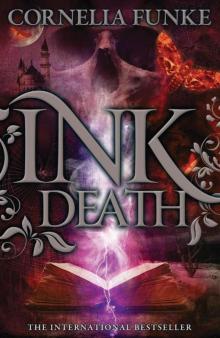 Inkdeath
Inkdeath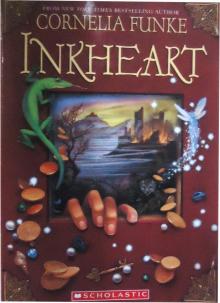 Inkheart
Inkheart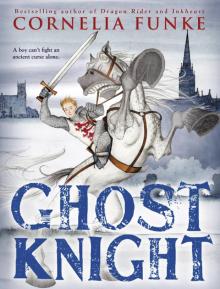 Ghost Knight
Ghost Knight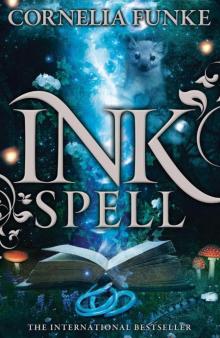 Inkspell
Inkspell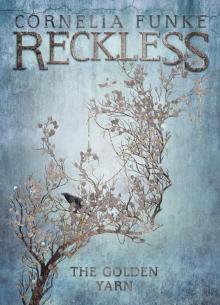 The Golden Yarn
The Golden Yarn Fearless
Fearless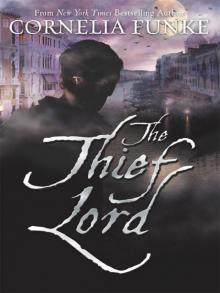 The Thief Lord
The Thief Lord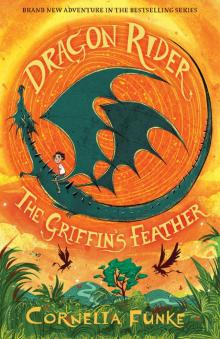 The Griffin's Feather
The Griffin's Feather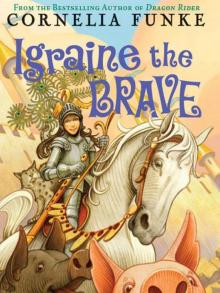 Igraine the Brave
Igraine the Brave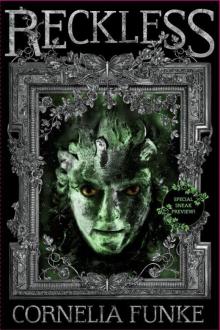 Reckless
Reckless When Santa Fell to Earth
When Santa Fell to Earth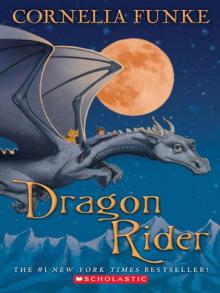 Dragon Rider
Dragon Rider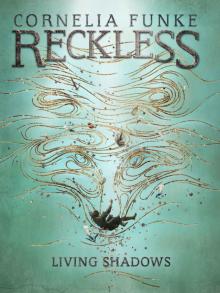 Living Shadows
Living Shadows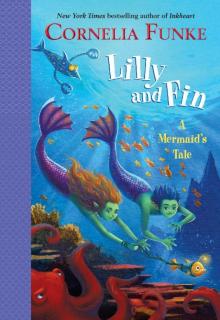 Lilly and Fin: A Mermaid's Tale
Lilly and Fin: A Mermaid's Tale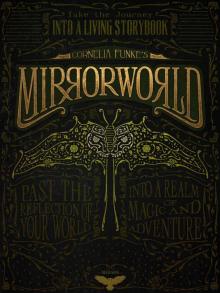 The MirrorWorld Anthology
The MirrorWorld Anthology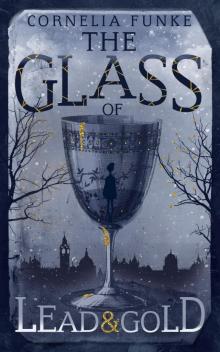 The Glass of Lead and Gold
The Glass of Lead and Gold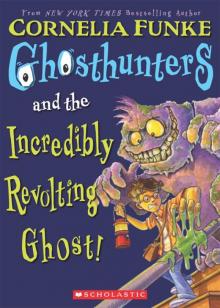 Ghosthunters and the Incredibly Revolting Ghost
Ghosthunters and the Incredibly Revolting Ghost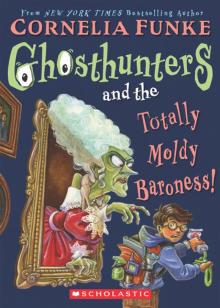 Ghosthunters and the Totally Moldy Baroness!
Ghosthunters and the Totally Moldy Baroness!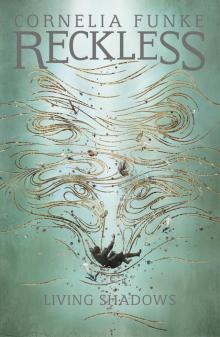 Reckless II
Reckless II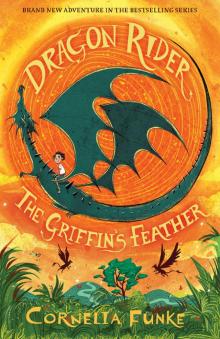 Griffin's Feather
Griffin's Feather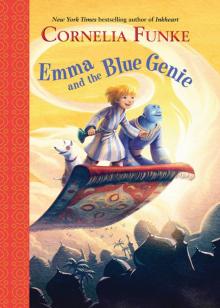 Emma and the Blue Genie
Emma and the Blue Genie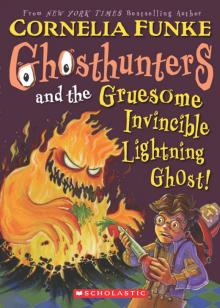 Ghosthunters and the Gruesome Invincible Lightning Ghost
Ghosthunters and the Gruesome Invincible Lightning Ghost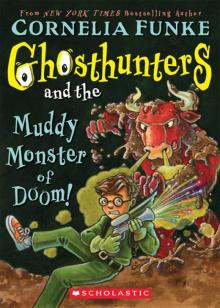 Ghosthunters and the Muddy Monster of Doom!
Ghosthunters and the Muddy Monster of Doom! Inkheart ti-1
Inkheart ti-1 The Pirate Pig
The Pirate Pig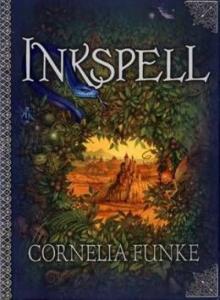 Inkspell ti-2
Inkspell ti-2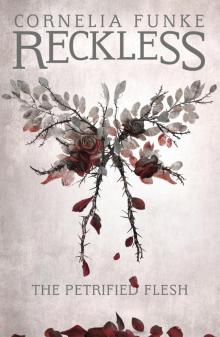 The Petrified Flesh
The Petrified Flesh Inkdeath ti-3
Inkdeath ti-3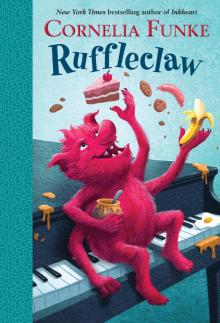 Ruffleclaw
Ruffleclaw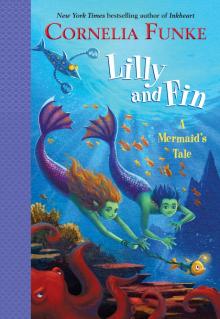 Lilly and Fin
Lilly and Fin